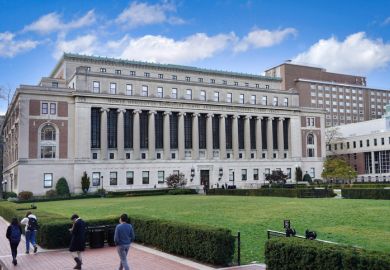Source: Landmarkmedia/Shutterstock.com
Labour’s manifesto has introduced a statement that the party’s pledge to lower fees to £6,000 would be funded, in part, by “clamping down on tax avoidance”.
The party says in its manifesto, published on 13 April, that lowering fees from £9,000 to £6,000 would be “funded by restricting tax relief on pension contributions for the highest earners and clamping down on tax avoidance”.
When the party originally announced the policy in February, it said the move was “funded by restricting pension tax relief for those on the highest incomes”. Labour estimated in its February announcement that the lowering of fees to £6,000 would cost £2.7 billion a year.
The change in Labour’s funding plan appears to have come about as a result of moves announced by George Osborne, the chancellor, in his March budget, which diverted to other purposes £600 million of annual savings that Labour had planned to use to help lower fees.
Labour’s statement that it will raise some of the funds needed to cover the replacement of lost fee income for universities via “clamping down on tax avoidance” may heighten concern about the funding plan behind the £6,000 policy among some vice-chancellors.
In the budget, Mr Osborne said that he would cut the lifetime allowance for tax relief on pension contributions from £1.25 million to £1 million – one of the measures Labour had said it would introduce to raise £600 million to help fund its cut in fees, alongside two other pension tax relief changes.
But Mr Osborne said he would not use the savings to lower fees as Labour’s plan involved “penalising moderately paid, long-serving public servants, including police officers, teachers and nurses” on their pensions to reward “higher-paid graduates”. The chancellor, instead, apparently opted to use the savings to cut the deficit.
The move was seen by observers as an attempt by Mr Osborne to “shoot Labour’s fox” on fees. But Ed Balls, the shadow chancellor, said after the budget: “We had three measures which we announced to pay our tuition fee [policy]. He [Mr Osborne] left two of them entirely untouched – those are the two which have the large bulk of the revenue. So what he has done here is less than a fifth of the overall sum of money for our tuition fees pledge.”
Nevertheless, Mr Osborne’s move appears to have forced Labour to look to other sources to help fund its fees plan.
On vocational higher education, Labour’s manifesto echoes earlier policy statements by saying: “We will make sure that apprenticeships can lead to higher-level qualifications by creating new Technical Degrees and supporting part-time study. They will be co-funded, co-designed and co-delivered by employers and they will be the priority for expansion within our university system.”
On immigration, the manifesto says: “Short-term student visitor visas have dramatically increased, so we will tighten the system to prevent abuse, whilst welcoming overseas university students who bring billions into Britain. And we will keep the cap on workers from outside the EU.”
The manifesto does not mention the government’s existing policy to lower net migration into the UK to the “tens of thousands”. Universities have long lobbied for students to be excluded from the net migration target.
Labour’s manifesto would appear to echo the stance set out by Yvette Cooper, the shadow home secretary, who has previously said that the party would not adopt a single net migration target, instead setting a series of caps for non-EU workers. Ms Cooper has said non-EU students “should be taken out of the net migration target straight away”.
Responding to the manifesto, Greg Clark, minister for universities, science and cities, said Labour had “assured” universities that the shortfall in funding from their tuition fee cut would be met, “but instead we have a hollow promise that it will be part funded by ‘clamping down on tax avoidance’”.
“The current system is seeing record numbers of students, including from the most disadvantaged backgrounds, going on to higher education. Labour wants to put all this at risk in a move that only benefits the wealthiest graduates and is bad for taxpayers, bad for universities and bad for students,” he said.
Register to continue
Why register?
- Registration is free and only takes a moment
- Once registered, you can read 3 articles a month
- Sign up for our newsletter
Subscribe
Or subscribe for unlimited access to:
- Unlimited access to news, views, insights & reviews
- Digital editions
- Digital access to THE’s university and college rankings analysis
Already registered or a current subscriber? Login




